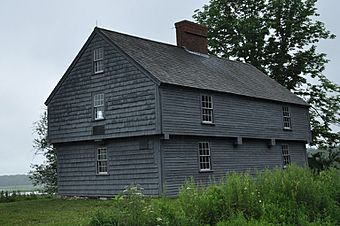McIntire Garrison House facts for kids
|
McIntire Garrison House
|
|

Side view of the house
|
|
| Location | Cider Hill Road (SR91), York, Maine |
|---|---|
| Area | less than one acre |
| Built | 1707 |
| NRHP reference No. | 68000017 |
Quick facts for kids Significant dates |
|
| Added to NRHP | November 24, 1968 |
| Designated NHL | November 24, 1968 |
The McIntire Garrison House is a very old and special house in York, Maine. It stands on Cider Hill Road (Maine State Route 91). Built around 1707, it is a rare and well-kept example of a colonial log "garrison house."
Settlers built these houses for defense against attacks. This house might even be the oldest one in Maine! Because it is so important, it was named a National Historic Landmark in 1968.
Exploring the McIntire Garrison House
What Does This Old House Look Like?
The McIntire Garrison House is located in a quiet, rural part of York, Maine. It sits on the south side of Cider Hill Road. From there, it looks out over a curve in the York River.
It is a two-story building made from logs. The outside is covered with wooden boards called clapboards. It has a roof that slopes down on two sides, with a chimney in the middle.
A cool feature is that the second floor sticks out a little bit over the first floor. This happens on all four sides of the house. One side even has a special trapdoor! This trapdoor was likely used to see below or to drop things on attackers.
The walls are made of thick logs, about 7.5 inches (19 cm) wide. These logs are fitted together tightly at the corners using a special method called dovetailing. The inside of the house is very simple. It has wooden floors, walls covered with panels, and ceilings that are not finished. The windows you see today were added later. They are not the original windows from when the house was built.
A Look Back in Time: Its History
For a long time, people believed this house was built in 1645. However, experts who studied the building in the 1900s found something different. They discovered it was built using methods that became common in the early 1700s. This means it was likely built around 1707.
Houses like this were common in southern Maine during the colonial period. This was a time when the area often faced attacks from Native American groups. Sometimes, French forces also joined these attacks. When the house was first built, it would not have been covered in clapboards.
In the early 1900s, people tried to "restore" the building. Later in the 1900s, a more careful restoration was done. This second restoration made sure the house looked more like it did when it was first built.
 | Percy Lavon Julian |
 | Katherine Johnson |
 | George Washington Carver |
 | Annie Easley |



